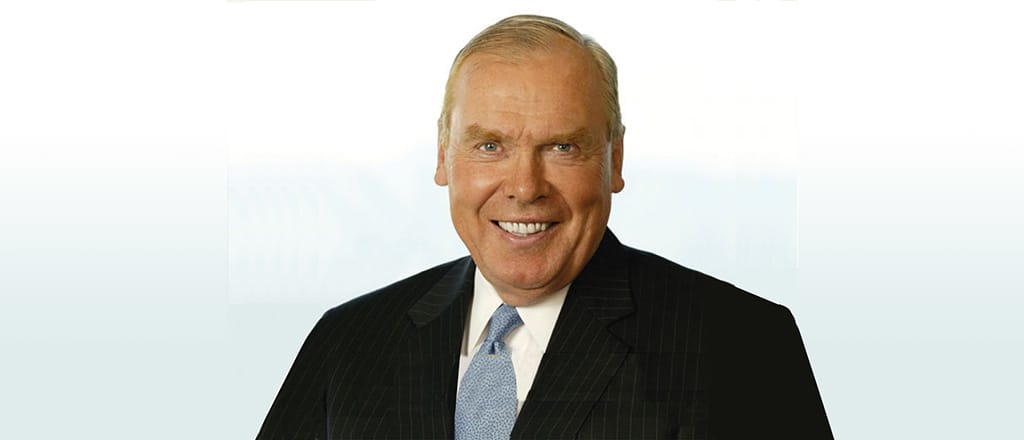In September 2005, Jon M. Huntsman, Sr. W59 Hon96 traveled to China. He was at a business school in Shanghai to speak about his recently published book, Winners Never Cheat, but in an off-the-cuff detour that fascinated his audience, he ended up talking about funerals.
“I have attended many funerals in my life,” Huntsman said, adding that he had conducted almost 200. “I have never heard in a funeral that this person made a lot of money or is politically very strong. They never discuss that. In a funeral, people discuss how this person was kind or gracious or had character and integrity. … For some people who are not kind, thoughtful or gracious, their funerals are very short. Nobody has anything to say. I learned from the funerals that we must plan our funerals when we are young. Plan your funeral, start early, by being kind.”
By that measure, Huntsman’s own funeral will not be short. He presumably planned his memorial long before his death on February 2 at age 80, because he was among the kindest and most compassionate business leaders and philanthropists of our times. Though he grew up in modest circumstances, Huntsman had an astute business mind. During the 1970s, he launched a packaging firm that made, among other products, plastic clamshell containers that McDonald’s used for the Big Mac. After that company was sold, Huntsman went on to build Huntsman Corporation, a global chemicals giant with operations in more than 30 countries, $8 billion in annual revenues and 15,000 employees. Huntsman also had an active, though brief, political career in the Nixon administration.
At a time when ethical leadership is badly needed in business and politics, Huntsman stands out as a leader of enormous integrity. In Winners Never Cheat, published in 2005, Huntsman wrote that while bribery might seem to offer a temporary advantage, it “cheapens the way business is done, enriches only a few corrupt individuals and makes a mockery of the rules of play.” He learned—and taught—this lesson memorably in the 1980s when Huntsman opened a $30 million chemical plant in Thailand. A government minister invited Huntsman home for dinner and showed him a garage filled with 19 cars, given as “gifts” by foreign companies. Soon a request followed, channeled through a Japanese partner, for kickbacks of $250,000 a year. Huntsman’s response: “We had no intention of paying even five cents toward what was nothing more than extortion.”
Rather than succumb to corruption, Huntsman sold the plant and moved operations out of Thailand. “We lost about $3 million short term,” Huntsman later noted. “[Over the] long haul, it was a blessing in disguise. When the Asian economic crisis came several years down the road, the industry went down the drain.” Once the word spread that Huntsman would move his operations out of countries that demanded “fees,” he no longer faced such requests in Thailand or other countries.
“One woman … died and left her dog $10 million. What’s a dog going to do with that kind of money? Help other dogs?”–Jon M. Huntsman, Sr.
Huntsman combined integrity with warmth and compassion. Always a tough negotiator, in 1999, he was involved in ferocious discussions with Charles Miller Smith, then president and CEO of Britain’s Imperial Chemical Industries, to buy some of ICI’s chemical divisions. “It would be the largest deal of my life, a merger that would double the size of Huntsman Corp.,” he later wrote. “It was a complicated transaction with intense pressure on each side. Charles needed to get a good price to reduce some ICI debt; I had a limited amount of capital for the acquisition.” As the talks dragged on, Huntsman learned that Miller Smith’s wife had terminal cancer. As a result, the ICI CEO became emotionally distracted, and later—after her death—distraught. Though the negotiations were still going on, Huntsman decided to settle. “I probably could have clawed another $200 million out of the deal, but it would have come at the expense of Charles’s emotional state,” he said. “The agreement as it stood was good enough. Each side came out a winner, and I made a lifelong friend.”
Compassion also inspired Huntsman’s philanthropy. In a 2014 conversation about his memoir, Barefoot to Billionaire: Reflections on a Life’s Work and a Promise to Cure Cancer, Huntsman told Wharton’s Adam Grant about his approach to entrepreneurship and philanthropy.
In 1992, Huntsman funded the Huntsman Cancer Institute at the University of Utah and, over the years, gave more than $1.9 billion to cancer research. He was also generous with Wharton and Penn—which Huntsman attended as an undergrad—in terms of time as well as money. According to Wharton Dean Geoff Garrett, “Jon’s extraordinary vision and commitment created an amazing home for the [Wharton] school in Jon M. Huntsman Hall. He founded the Huntsman Program in International Studies and Business and established the Patrick T. Harker Professorship. He received the Dean’s Medal, Wharton’s highest honor, which recognizes contributions to the global economy that improve the lives of people worldwide.”
What made Huntsman the kind of man he was? He provided part of the answer in the introduction to his memoir. “I desire to leave this world as I entered it—barefoot and broke,” he wrote. “To many, that may seem like an odd, unrealistic, even foolish thing. Not to me. Too many wealthy people hoard their riches, believing that dying with a large bank account is a virtue. I read about one woman who died and left her dog $10 million. What’s a dog going to do with that kind of money? Help other dogs? I see it another way: If I die with nothing because I have given it away, humanity is the beneficiary.” And so it has—humanity has indeed been the beneficiary of his legacy.
Thank you, Jon Huntsman.

























